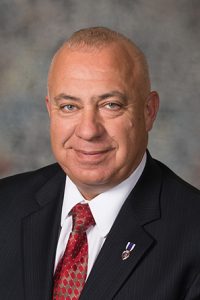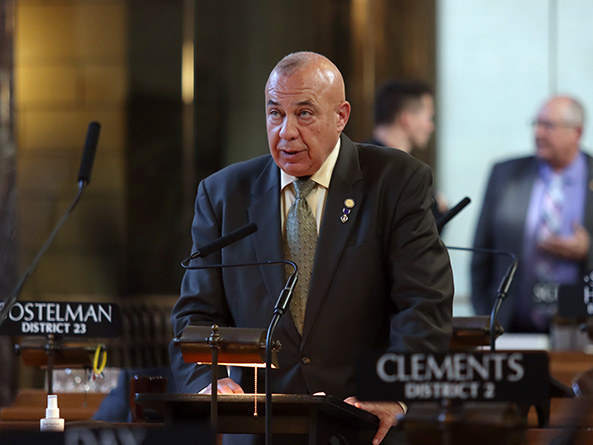Bill to eliminate concealed handgun permit requirement advanced after cloture
Lawmakers advanced a bill from general file March 11 that would allow Nebraskans to carry a concealed handgun without a permit after a successful cloture motion.

Current state law requires that an individual pass a background check, submit a $100 permit fee and complete a safe firing and handling gun course to obtain a concealed carry permit.
LB773, introduced by Gordon Sen. Tom Brewer, would waive those requirements and allow an individual who would not otherwise be prohibited from possessing or carrying a gun in Nebraska to conceal carry a firearm. Registration and training courses still would be offered but would no longer be required.
Carrying a concealed handgun while under the influence of alcohol would remain illegal and concealed handguns would remain prohibited in schools, certain government premises and private businesses that have such rules in place.
The bill — referred to by proponents as “constitutional carry” based on their contention that the right to bear concealed arms should not be limited by state laws — was placed on general file March 9 after a successful procedural motion to pull it from the Judiciary Committee. The committee was deadlocked and had not voted to advance the bill or to kill it.
Brewer said the Legislature has a responsibility to the U.S. Constitution and to the people of Nebraska to uphold the Second Amendment. The state should not be in the business of treating a constitutional right as a privilege, he said.
“Concealed carry gives you the ability to protect yourself and your family and to do that in a way that no one else feels threatened — and again — this is a right, not a privilege,” Brewer said. “Currently, in the state of Nebraska, it’s legal to open carry. But … if you put on your coat and you cover that firearm, now you’re a criminal,” Brewer said.
Sterling Sen. Julie Slama spoke in support of LB773. Passage of constitutional carry bills in other states rarely has resulted in increased gun violence, she said, and the few instances of such increases have been due to other factors.
Henderson Sen. Curt Friesen also spoke in support of the proposal, saying that for someone who feels they are in danger and wants to carry a firearm, the permitting process sometimes can take too long and can be cost prohibitive.
“I don’t carry concealed but I have a permit and I appreciated the education that came with that,” Friesen said. “But, at the same time, I feel there are people who can’t afford the process of going through that and they should still have the right to carry a firearm if they so choose.”
Sen. Michael Flood of Norfolk, speaking in support of LB773, said that the people of Nebraska want gun rights — not training and permit requirements. Removal of the state’s conceal carry permit requirements would protect gun rights without opening the door to convicted felons, fugitives or people with dangerous mental health conditions to own handguns, he said.
Brewer offered an amendment that he said was a compromise to remove opposition to the bill by the Omaha Police Department. Among other provisions, the amendment would allow a metropolitan class city — Omaha is the only metropolitan class city in Nebraska — to require handgun registration, except for individuals with a conceal carry permit. The amendment also would make it an additional offense to carry a concealed handgun during the commission of an array of other offenses.
Sen. Adam Morfeld of Lincoln spoke in opposition to the Brewer amendment and the underlying bill. No right is absolute, he said, and all constitutional rights can be constrained when the government has a valid need to do so.
“Rights are not unlimited, even constitutional rights,” Morfeld said. “The Supreme Court has found time and time again that reasonable regulations of guns are constitutional. When it comes to reasonable regulations of firearms, there is a compelling statewide interest because there is a gun violence problem in our country.”
Omaha Sen. Terrell McKinney also spoke in opposition to the Brewer amendment, which he said would “carve out” different rules for the Omaha Police Department — which he said discriminates against Black people through over policing. Allowing OPD but not the rest of the state to register guns and enhancing penalties for concealed carry would not help North Omaha, he said.
“If the Constitution says that we should have the right to bear arms — then that doesn’t mean we carve out something to protect the police department,” he said.
Brewer later pulled the amendment and refiled it for consideration on the next round of debate, saying he would continue to work to find a more suitable compromise.
Morfeld offered and later withdrew an amendment that would require the Nebraska Commission on Law Enforcement and Criminal Justice to cover the expense of issuing, renewing and administering conceal carry permits.
He said the amendment would address concerns expressed by the bill’s supporters that the expense to obtain a conceal carry permit is a barrier to Second Amendment rights. Adding the provision would remove that barrier while still requiring individuals to go through a background check and obtain training, he said.
Sen. Steve Lathrop of Omaha opposed LB773 but spoke in support of the Morfeld amendment. Lathrop said the current permitting process requires a certain level of training and screening, which he said helps to reduce the number of gun-related prison incarcerations.
“I have a concern that people will get a handgun without a permit and without any training,” he said. “We see an awful lot of people who — with a firearm — are doing things they don’t have any legal right to do and somebody gets killed. Now, they’re charged and [serving] a life sentence.”
Senators rejected an amendment, 14-30, by Omaha Sen. John Cavanaugh to add provisions of his LB1051 that would allow individuals previously convicted of carrying a concealed handgun without a permit to file a motion to set aside that conviction.
“If the Legislature is to decide that something is no longer criminal, we should make sure those people previously convicted of that crime have a means by which to have that conviction removed from their record,” Cavanaugh said. “It holds us accountable to be consistent to our stated principles.”
After eight hours of debate, Brewer offered a motion to invoke cloture, which ceases debate and forces a vote on the bill and any pending amendments.
Lawmakers then adopted a technical Brewer amendment 39-2 and voted down a pending amendment from Omaha Sen. Machaela Cavanaugh and a Morfeld motion to bracket the bill.
Senators advanced LB773 to select file on a 35-9 vote.


